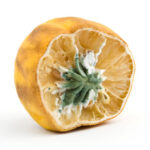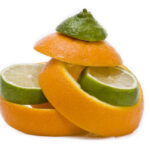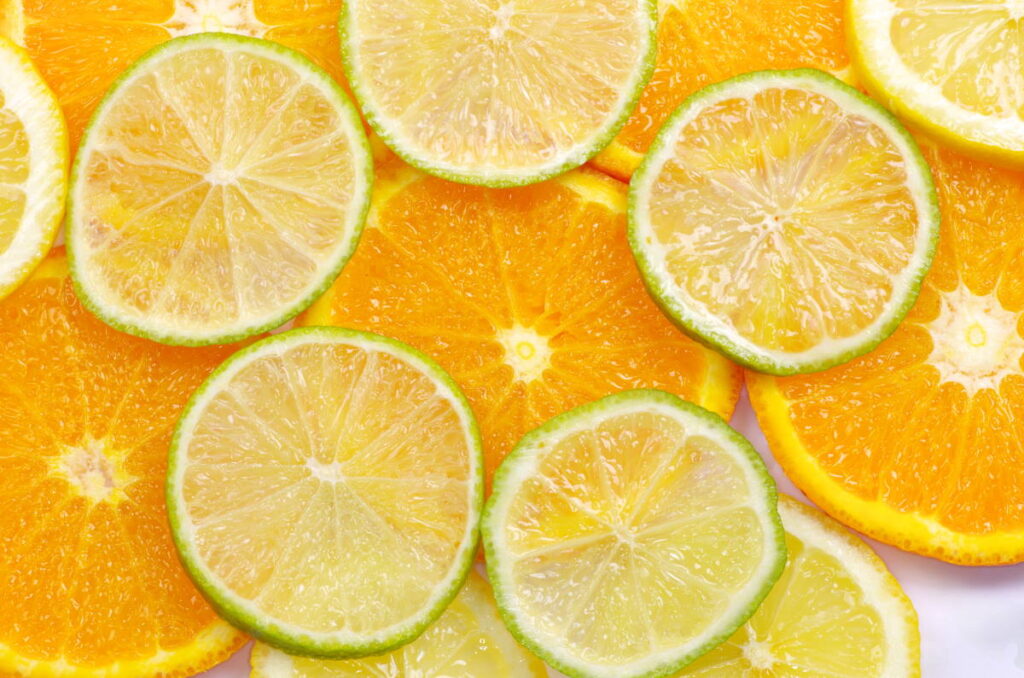You can add citrus fruits to your compost pile, including rinds, meat, and the rest of the fruit. There are a few things to be careful of before you go dropping a bushel of oranges into your compost, though. Can you compost citrus fruit? Yes.
Citrus fruits will eventually break down. Those tough peels can take a while to break down. They’re built to protect the fruit, and they do so nicely.
Also, most citrus fruits are acidic. You can add citrus fruits to your compost, but you want to do it in moderation. Otherwise, you may increase the acidity of your compost. If it becomes acidic enough, it could harm the bacteria and other organisms that do the composting. It could also harm the plants in your lawn or garden.
Some examples of citrus fruit include:
- Oranges
- Limes
- Lemons
- Grapefruit
How Do You Compost Citrus Fruit?
Composting citrus is pretty easy overall.
It’s a good idea to wash the peels first. Often we aren’t as diligent in this as when we eat other fruit because we aren’t going to eat the peels. Often, fruit is sprayed with insecticides. These insecticides aren’t great for your compost or the organisms in it. Washing them off can help to reduce the risk. Often, the insecticide has very small amounts by the time we eat them, so if you forget, the world won’t end. It’s a good idea just to be sure.
Another way to make composting citrus fruit easier is to dry out the peels before adding them to the compost. This starts the decomposition process and will speed things up in your compost pile.
As with most things, you’ll get the best results if you cut it into smaller pieces. With the peels especially, it’s a good idea to cover it with brown material and to turn it regularly to keep it aerated.
It is a good idea to remove the seeds if you can. Unless you are using hot composting, your compost pile won’t get warm enough to kill off the seeds. If you leave seeds in, they will likely survive the composting process. This means you may see seedlings in your garden, lawn, or wherever you use your compost. It’s not the end of the world. Pull them out, and away you go.
Composting Citrus Fruit with Worms
Add citrus in very small amounts to your worm bins. Citrus contains a substance called limonene, a colorless liquid that is the primary component of oils in citrus peels. While limonene is used in various personal care products, it is toxic to worms. It acts as a neurotoxin to them and can harm them. It gives citrus fruit their distinctive odor.
So, avoid adding orange peels to worm composting bins, or add them in very small amounts.
Can I Compost Citrus Fruit?
Yes, you can. You want to do it in moderation and be particularly careful with vermicomposting systems. Other than that, they’re pretty easy to compost and add value to your compost pile.
Frequently Asked Questions about Adding Citrus Fruits to Compost
Can I Compost Moldy Citrus Fruit?

Yes, you can. In fact, the decomposition process has already started. One catch to this is homegrown fruit. Commercially grown fruit has an antifungal applied to prevent the penicillium mold from growing on it. This mold can harm your garden and your compost. Home-grown fruit can grow this mold, but it’s unlikely. (More on that below.)
Can I Compost Citrus Fruit Peels?

Yes! Absolutely. Composting fruit peels is a great way to reduce waste and add nutrients back into your compost pile. Of course, all things are in moderation. Adding a few citrus fruits a week is no problem. Daily juicing, and you should go easy on what you add.
Will Citrus Fruit Kill off My Worms?
Citrus peels can grow penicillium mold. This can be very harmful to people, pets, and plants. So, we don’t want it. However, it’s typically not a problem for a couple of reasons.
1. Penicillium mold likes cool, damp spaces. While your compost pile is damp, it’s rarely cool. This mold wants basically a refrigerator or a basement. A healthy compost pile is many times warmer than that. This should not be a problem if you have a good, robust, healthy compost pile and the citrus peels are toward the middle.
2. This isn’t usually an issue because commercial fruit is typically sprayed with an antifungal to avoid this mold. Citrus growers don’t want it any more than you do. Homegrown fruit won’t have this, but the first reason should help avoid issues here.
